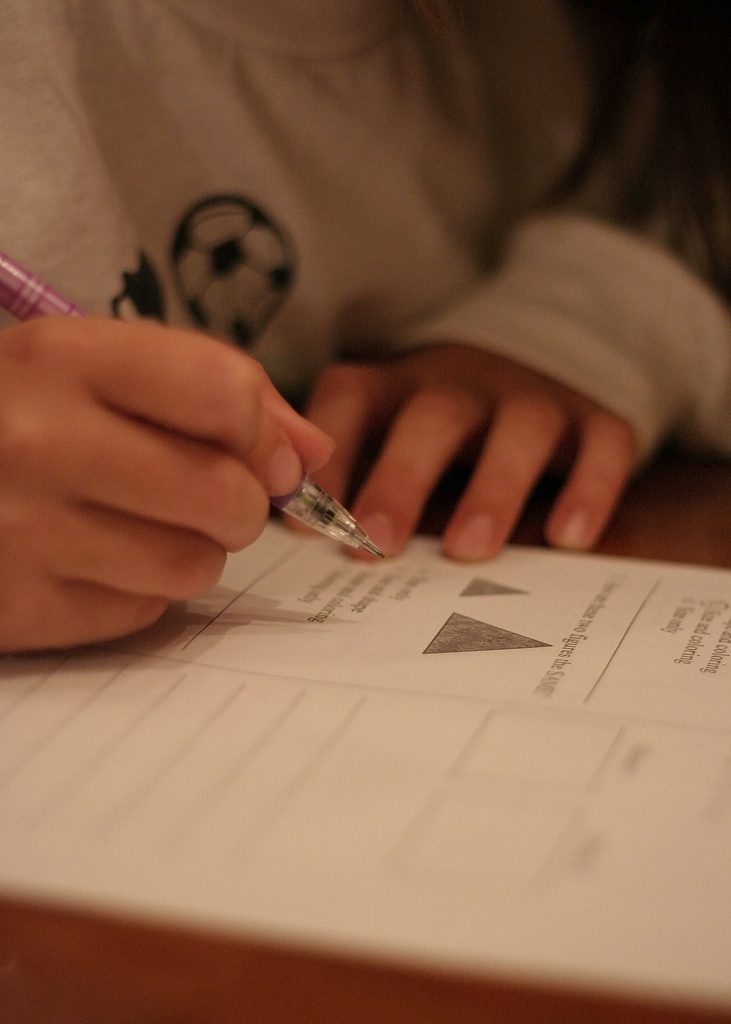By 8:30 on Tuesday night, I was ready to go home and curl up with a good book. But there I was, crammed into a windowless computer lab with 25 other exhausted parents, listening to the new math teacher describe how math instruction would work this year.
He described how the Common Core standards will change math education and showed off the fancy online curriculum that our school is lucky to have. Then he asked for questions — and the parents pounced. Poor guy.
See, this fellow is exactly what students need. He’s tough; he’s smart; and he thoroughly understands a critical element of mathematics education: Kids have got to take risks that might not lead to a solution. Just like Sir Isaac Newton and Albert Einstein and Ada Byron Lovelace (yes, she’s Lord Byron’s daughter and the founder of scientific computing) went down long and winding roads to their discoveries, our kids must do the same.
But the parents were having none of that. The homework that Mr. T is sending home each night is really challenging. Really challenging. My daughter was complaining and crying and slamming doors because of it. And I know we weren’t alone in our little nightly soap opera.
As the parents got more frustrated and asked more and more questions about grading and building confidence and avoiding stress, I realized that they were missing the whole point. As parents, it’s not our job to shelter our kids from struggle and frustration. I was having a really hard time resisting the urge to step up to the front of the room and do some damage control.
So I figured I should take this opportunity to share my ideas here. Fact is, Common Core may mean that your child is more frustrated. But there are ways to cope.
1. Get proactive
What do the Common Core objectives say? Well, they’re no big secret. Check out this grade-by-grade list. I want you to notice something really, really important: the list of concepts your child is expected to grasp by the end of the year is pretty darned short. At the same time, these ideas are pretty robust. The objectives cover less material and fewer facts, but they do so more deeply.
Armed with some information about Common Core, you will be better able to set the parameters around what your child is learning at home. If solving for x is not on that list, don’t expect your child to do it. But if ratios are, it could be helpful for you to brush up on those concepts. (See Wednesday’s post for help on this.) But not so you can walk your child through a process. (Keep reading for more info on that.)
2. Meet the teacher
And at this meeting, don’t get hung up on grades and tests. Ask her what her teaching philosophy is. Ask what she wants you to do to help support your child’s learning. It is very possible that you’re making assumptions about your role. Depending on your child’s age, you might need to offer a great deal of help. Or you might need to back off. Your child’s teacher can tell you for sure.
If your child has math anxiety, this is a great time to share that with the teacher. Sometimes even the best teachers inadvertently send messages to their kids that unnecessarily ups the anxiety. (Some struggle is good; too much can shut down the pathways of critical thinking.) Offering the teacher a little background in your kids’ previous math experiences can be really useful.
3. Trust
This is probably the hardest step, but unless you have really good reason not to, you must trust your child’s teacher. Seriously. In my observation, many parents think they understand everything about teaching, simply because they were once students.* That approach undermines teachers’ authority and ignores their education and expertise. It’s actually pretty insulting in some ways. Just because you can flush a toilet doesn’t mean you are a plumber. The same goes for teaching.
Teachers are not just experts in their field of study (math, Spanish, English, science); they’re experts in pedagogy, which is the practice of teaching. And pedagogy is much more mysterious than trigonometry or set theory. It’s where the science and art of teaching collide. The way in which topics are introduced and explored in the classroom is a careful dance. Sadly, some of this can be undone at home, during the homework wars.
Unless you believe your child’s teacher is downright incompetent, you’ve got to trust that she knows what she’s doing. Chances are, there’s very good reason she sent home those challenging problems.
*This goes for homeschooling parents, too. Anyone who has been successful with homeschooling will tell you that there’s a lot to learn about pedagogy — from the developmentally appropriate times to introduce certain concepts to proven ways to encourage exploration and discovery.
4. Stop spoonfeeding
Especially when kids enter middle school, we parents need to back off — big time. Yes, we want them to succeed. But what may be even more important is this lesson: failure is a part of learning.
I don’t mean that you should be okay with a failing grade or ignore his bellowing, “I DON’T UNDERSTAND!!’ But at some point (very soon!), you must stop checking his assignments or walking him through each and every problem. You also need to endure his frustration. When children make mistakes, they can learn from them. When they struggle, they learn they can overcome adversity.When you swoop in to rescue your child from struggle and frustration, you are actually depriving him of these important lessons. (If you want your kid to live in your basement, rent-free, after graduation, ignore the above.)
Check with your child’s teacher about the grading process for homework. Will he be expected to get the answers right? Or is the teacher merely expecting an honest effort? If effort is the main theme (and I hope it is!), quit trying to explain to your child how to do the work. Instead, offer support and encouragement. If you believe your child can succeed, he’ll believe it too.
5. Get curious
One of the best ways to get involved with your child’s education is to ask questions. Kids are rarely given an opportunity to verbalize what they understand about math. Curiosity is a is a huge gift you can give your kids. But in case you’re stuck, try keeping these questions in your back pocket for stressful times:
— What do you know about the problem? (Encourages your child to think critically about the information included in the problem.)
— What are you being asked to do? (Prompts the child to identify the question in the problem.)
— If your math teacher were here, what would she say? (Demonstrates an alliance between yourself and the teacher, and gives you information about her expectations.)
— What ideas do you have for solving the problem? (Helps students identify problem-solving techniques, like making a list, guess-and-check, drawing a picture, etc.)
Read through the above questions again. What do you notice about them? Yep, not a one of them has anything to do with getting the answer. Not a single one. And that’s because it’s not your job to find the answer. Your job is to help your child move towards an answer, not solve the problem for him.And with questions like these, you’re helping your child see math as a process, not merely a solution.
This is hard work. Even with my background in math education, I’m struggling with homework histrionics. It is no fun to come home from a long day at work, only to be pulled into an emotional tangle over math. But I will guarantee this: If you’re working with a good teacher and you practice the steps above, your child will learn to feel very confident in his math skills. And he’ll be a much better grownup for it.
What do you think about this advice? Which of these steps are you already practicing? Which do you think are challenging to implement? Are there any that you think are downright wrong? Share your feedback in the comments below. And if you have further questions, ask them!






